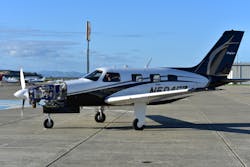ZeroAvia's Val Miftakhov makes a compelling case for hydrogen aviation
CRANFIELD, UK - Everybody but the oil companies wants electric aviation to take off as quickly as possible, if you'll pardon the pun. The aviation industry is a huge polluter, and electric aircraft will not only be cleaner, but significantly cheaper in terms of energy and maintenance. The problem is batteries, whose terrible energy density is simply not up to any practical aeronautical purpose at this stage, and there's no guarantee that the vast amounts of research going on in the battery sector will change that any time soon, writes Loz Blain for New Atlas. Continue reading original article.
The Intelligent Aerospace take:
June 17, 2020 - The Federal Aviation Administration issued an Experimental R&D Certificate to ZeroAvia's Piper M-Class R&D platform in 2019. At a 2-ton takeoff weight and six seats in a business-class arrangement, it is currently the world's largest zero-emission aircraft flying without any fossil fuel support, according to the publicly available information. The aircraft has completed a variety of test flights, which validated key components and their integration into a complete powertrain system. These tests confirm the company's "fuel" economy and maximum power delivery targets.
ZeroAvia is initially targeting 500-mile flights to serve the short-haul and commuter air travel markets, which make up nearly half the commercial flights worldwide. Powered by ZeroAvia powertrains, smaller zero-emission aircraft will be able to achieve similar per-seat economics as today's large regional jets, allowing economical use of smaller local airports for point-to-point travel with virtually no security lines or delays, and a much more pleasant overall flying experience. In addition to passenger transport, the ZeroAvia powertrain will have applications across other use cases including cargo, air taxi, agriculture, as well as across the aircraft types, including manned and unmanned fixed-wing, rotorcraft, and more.
Related: ZeroAvia unveils 'zero emission' hydrogen-fueled electric powertrain
Related: Urban Aeronautics signs agreement with HyPoint to integrate hydrogen power in its eVTOL
Related: This hydrogen-powered flying saucer could be your electric taxi in five years
Jamie Whitney, Associate Editor
Intelligent Aerospace
